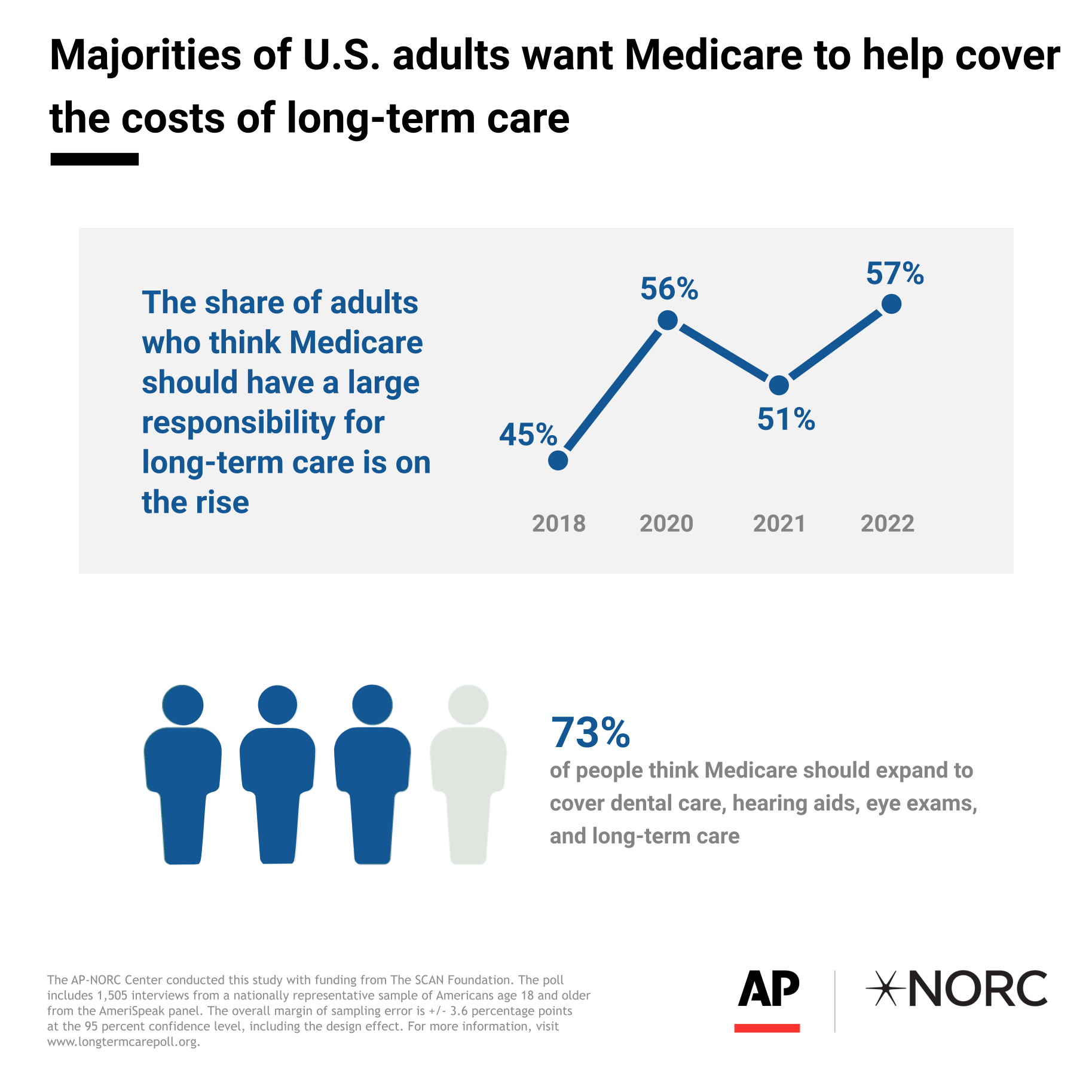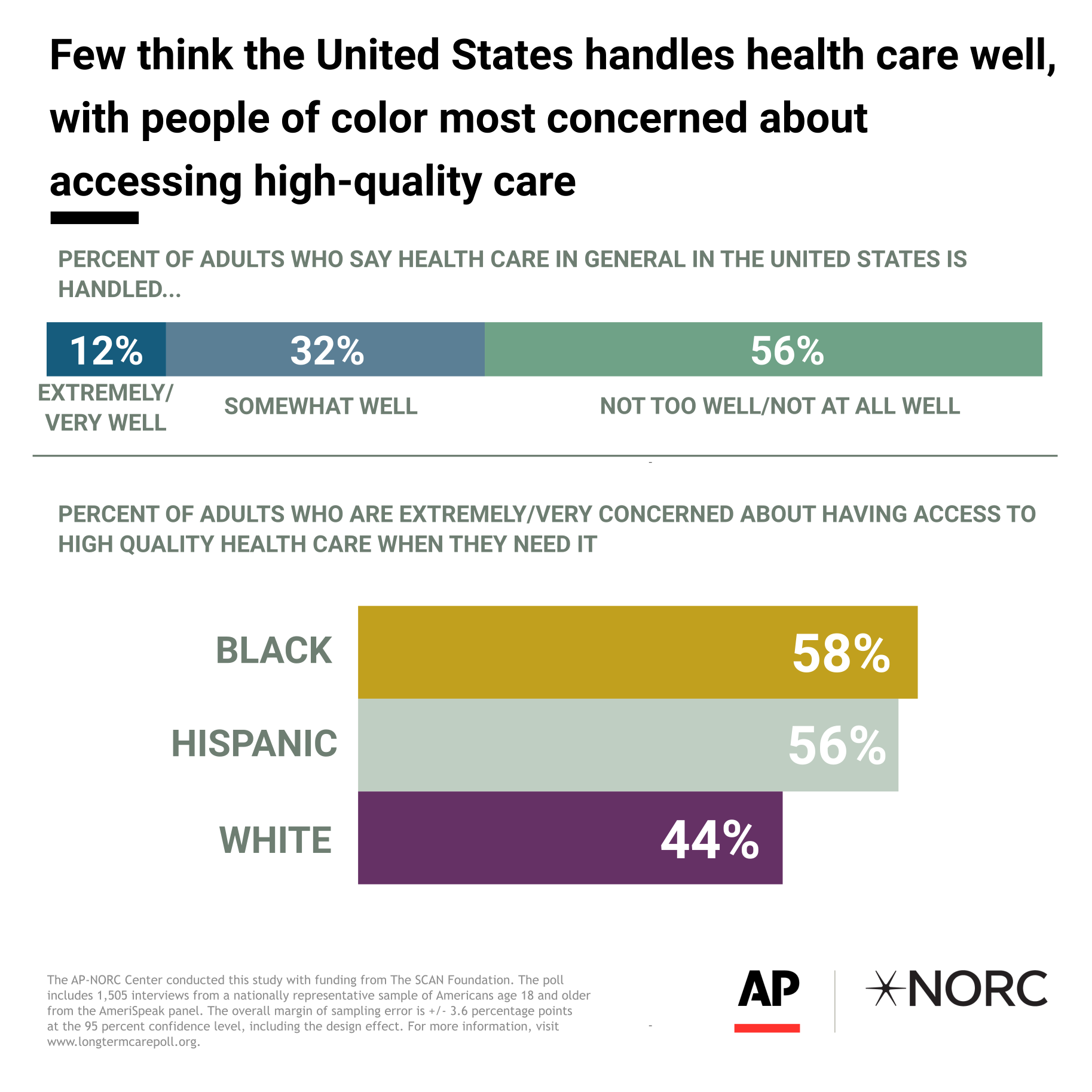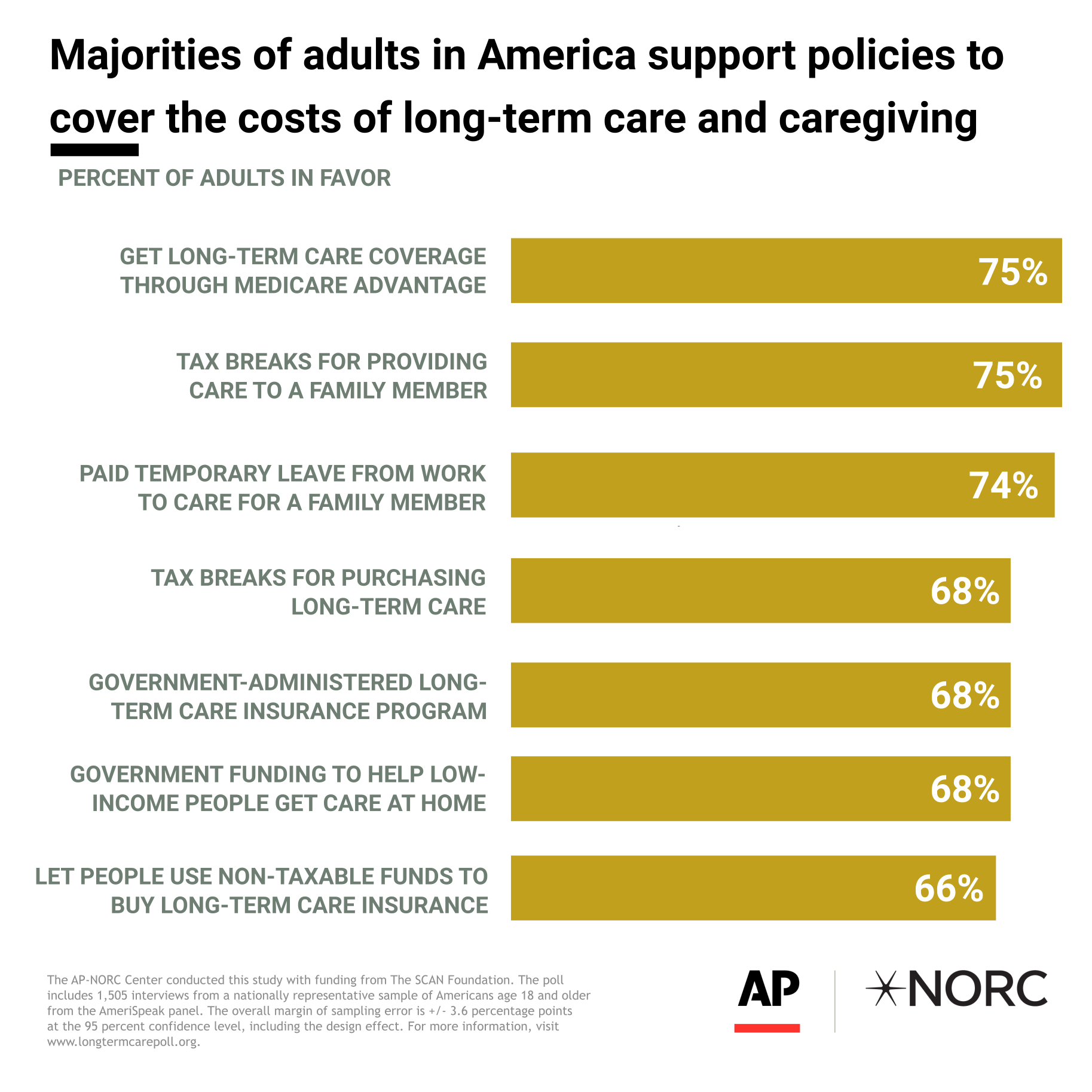News
Older people fret less about aging in place: AP-NORC Poll
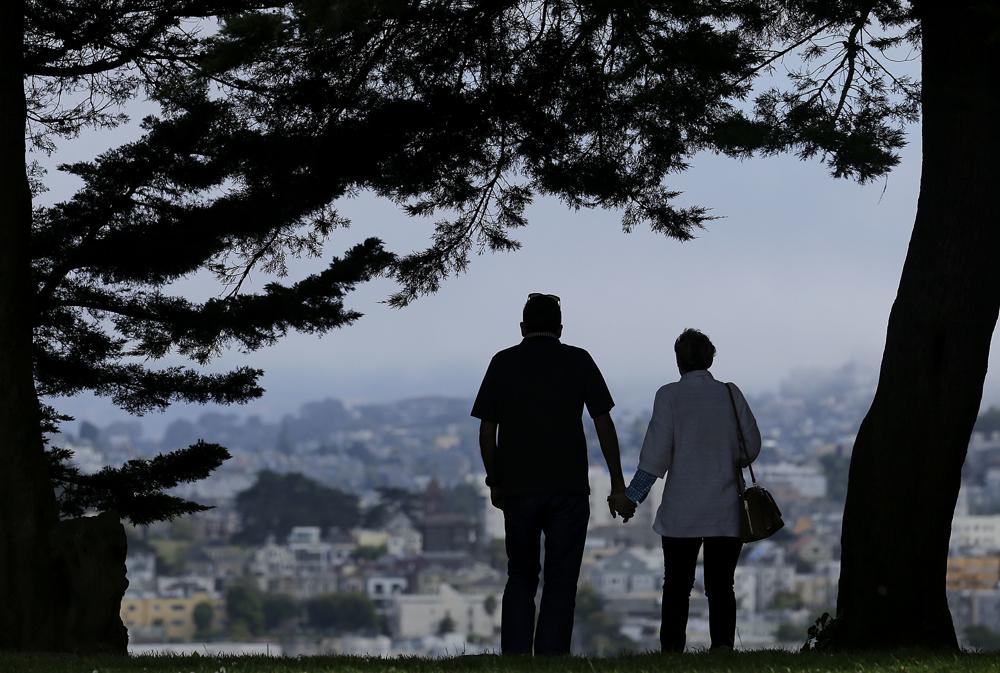
By Ricardo Alonso-Zaldivar | The Associated Press
April 27, 2022
WASHINGTON (AP) — The older you are, the less you fret about aging in your own home or community.
That’s a key insight from a new Associated Press-NORC Center for Public Affairs Research poll, which found that U.S. adults ages 65 or older feel much better prepared to “age in place” than those 50-64, who are mostly still in the final stretches of their working years.
The poll also documented greater insecurity around aging in place for older Black and Latino Americans, the likely result of a deep-rooted wealth gap that markedly favors white people.
Aging in one’s own home, or with family or a close friend, is a widely held aspiration, with 88% of adults 50 and older saying it’s their goal in an earlier AP-NORC poll.
The outlook among those 65 or older is upbeat, with nearly 8 in 10 saying they’re extremely or very prepared to stay in their current home as long as possible.
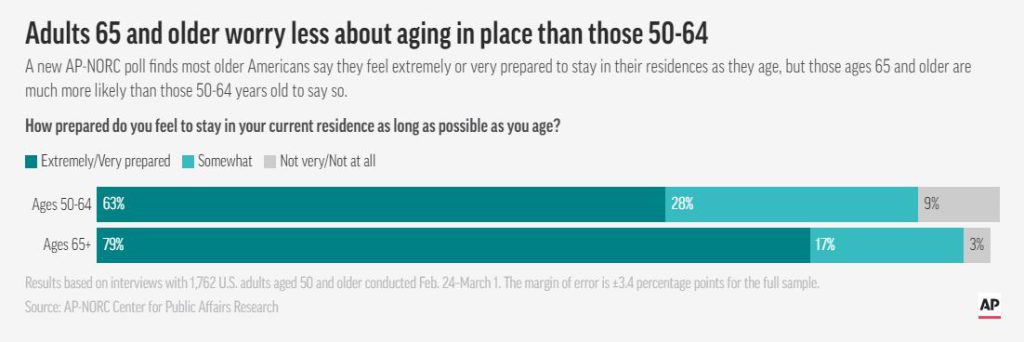
But doubts creep in for those ages 50-64. Among that group, the majority who rate themselves as extremely or very prepared shrinks to about 6 in 10, according to the poll.
This relatively younger group is especially likely to say their financial situation is the main reason they don’t feel very prepared to age in place. And they’re also more likely to feel anxious about being able to stay in their communities, get care from medical providers and receive backup from family members or close friends, the poll found.
Part of it may be due to fear of the unknown among people who’ve relied on a paycheck all their lives.
“When you’ve never done it before, and you are only going to do it once, you’re sort of flying by the seat of your pants,” said Leigh Gerstenberger, in his late 60s and retired from a career in financial services. “I spent a lot of time talking to people ahead of me in the journey,” says the Pittsburgh-area resident.
Also, people approaching their 60s may question if Social Security and Medicare will truly be there for them. Stacy Wiggins, an addiction medicine nurse who lives near Detroit, figures she’ll probably work at least another 10 years into her late 60s — and maybe part-time after that. Older friends are already collecting Social Security.
“In my group, you wonder if it’s going to be available,” Wiggins said of government programs that support older people. “Maybe it’s not. You will find people who are less apt to have a traditional pension. Those are things that leave you with a lot of trepidation toward the future.”
Some people now in their 50s and early 60s may still be dealing with the overhang of the 2007-09 recession, when unemployment peaked at 10% and foreclosures soared, said Sarah Szanton, dean of the Johns Hopkins University nursing school. For an aging society, the U.S. does relatively little to prepare older adults to navigate the transition to retirement, she observed.
“As Americans, we’ve always idolized youth and we’re notoriously underprepared for thinking about aging,” Szanton said. “It often comes as a surprise to people.” Her involvement with aging-in-place issues started early in her career, when she made house calls to older people.
In the poll, people 50 and older reported that their communities do an uneven job of meeting basic needs. While access to health care, healthy food and high-speed internet were generally rated highly, only 36% said their community does a good job providing affordable housing. Just 44% were satisfied with access to transportation and to services that support older people in their homes.
Kym Harrelson-Pattishall is hoping that as more people retire to her coastal North Carolina community, health care facilities and other services will follow. As it stands now, a major medical issue can involve a car trip of up to an hour to the hospital.
A real estate agent in her early 50s, Pattishall shares the goal of aging at home, but her confidence level is not very high. “I think it would just eat away what savings I have,” she said.
It’s all about adjusting, says another small-town resident, about 20 years older than Pattishall. Shirley Hayden lives in Texas, near the Louisiana border and on the track of hurricanes from the Gulf of Mexico. She says she has no investments and only modest savings, but she rates herself as very prepared to continue aging in place.
“You have to learn to live within your means,” Hayden said. “I don’t charge things I can’t afford to pay for.
“My biggest thing I have to work around as far as expenses is insurance,” she added. “I don’t really need any new clothes. In Texas, you live in jeans and T-shirts and they don’t go out of style. Yeah, your shoes wear out, but how often do you buy a pair of shoes?”
Not so easy to work around is the well-documented racial wealth gap that constrains older Black people in particular. A Federal Reserve report notes that on average Black and Latino households own 15% to 20% as much net wealth as white households.
In the poll, 67% of Black Americans and 59% of Latino Americans ages 50 and older said they felt extremely or very prepared to stay in their homes as long as possible, compared with the 73% share of white Americans saying they feel confident.
Wiggins, the Detroit area nurse, is Black and says it’s a pattern she’s familiar with. “Part of it is generational wealth,” she said. “I have friends who are white, whose dad died and left them settled. I have friends who are Black whose parents died, and they left enough to bury them, but nothing substantial.”
About half say Trump should be charged for 1/6: AP-NORC poll

By Farnoush Amri and Nuha Dolby
June 30, 2022
WASHINGTON (AP) — About half of Americans believe former President Donald Trump should be charged with a crime for his role in the U.S. Capitol attack on Jan. 6, 2021, a new poll shows.
The survey from The Associated Press-NORC Center for Public Affairs Research finds that 48% of U.S. adults say the Republican former president should be charged with a crime for his role, while 31% say he should not be charged. An additional 20% say they don’t know enough to have an opinion. Fifty-eight percent say Trump bears a great deal or quite a bit of responsibility for what happened that day.
The poll was conducted after five public hearings by the House committee investigating Jan. 6, which has sought to paint Trump’s potential criminal culpability in the events that led to deadly insurrection. But it was taken before Tuesday’s surprise hearing featuring former Trump White House aide Cassidy Hutchinson. Her explosive testimony provided the most compelling evidence yet that the former president could be linked to a federal crime, experts say.
Views on Trump’s criminal liability break down predictably along party lines, with 86% of Democrats but only 10% of Republicans saying Trump should be charged with a crime. Among Republicans, 68% say he should not be charged and 21% say they don’t know. Still, the fact that nearly half the country believes he should be prosecuted is a remarkable position for the former president, pointing to the difficulties he could face if he makes another run at the White House in 2024.
For Ella Metze, a South Carolina Democrat, Trump’s culpability has been clear from the beginning, when he urged his supporters to march to the Capitol on the morning of Jan. 6 and “fight like hell.”
“It was meant to provoke violence because he kept encouraging them,” the 86-year-old told The Associated Press. “As it happened, I watched it all and I just thought why doesn’t somebody stop this? Why doesn’t he stop this?”
Chris Schloemer, a Texas independent, agreed Trump holds responsibility for egging on the crowd with his baseless claims of election fraud. But, the 61-year-old doesn’t lay the blame solely on Trump.
Schloemer feels Republicans in Congress have a hand in what happened that day, too: “I feel like people were afraid of Donald Trump, especially Republican politicians, and so they wouldn’t rein him in, and I think that just emboldened him.”
And he’s not alone. While views of Trump’s role have not changed since December, Americans are somewhat more likely now than they were then to say Republicans in Congress were significantly responsible for the events of Jan. 6.
Forty-six percent say that now, up slightly from 41% in December. An additional 21% say GOP lawmakers had some responsibility and 30% say they were not responsible. The change in the share saying Republicans in Congress have a large amount of responsibility was driven mostly by Democrats and independents.
Ulysses Bryant, a Democrat from Florida, said while he always believed Trump and the rioters should be charged with a crime, he hadn’t known of the involvement of congressional Republicans until he began to follow the hearings.
Close to 6 in 10 Americans — 56% — say they followed news about the congressional hearings. A smaller but still sizeable share — 42% — say they watched or listened.
The nine-member panel, comprising seven Democrats and two Republicans, has worked around the clock for the past year to investigate the connection between Trump and his allies and the violence and chaos that ensued on the Capitol. The public hearing phase of their investigation is meant to put all of that investigative work on display to the American public in an effort to create a historical record of what occurred.
Seventy-five percent of Democrats and 42% of Republicans say they followed news about the hearings. More Democrats than Republicans also say they tuned in, 58% to 27%. The first of the public hearings, which began in early June, received high ratings for TV viewership, though subsequent hearings have received more modest ratings.
Kathlyn Keller, a retired investment banker from San Francisco, is one of the GOP voters who has tuned into the hearings and still believes Trump holds no responsibility for the events of that day.
The 83-year-old thinks the only people who should be charged are those who brought weapons to the Capitol, or anyone who got into the building and caused damage inside. Trump “absolutely shouldn’t be charged with anything,” she told the AP.
Nonetheless, the committee plans to continue its congressional probe and present new evidence in the coming weeks to its many viewers, including the most important one: Attorney General Merrick Garland. Regardless of public opinion about Trump’s likely criminal involvement, lawmakers continue to face a stark reality: While they can investigate Jan. 6 and issue subpoenas to gather information, only the Justice Department can bring criminal charges.
But there are clear signs in recent weeks that the Justice Department appears to be escalating its probe of pro-Trump efforts to overturn the 2020 presidential election. Federal agents on Wednesday seized the cellphone of Trump lawyer John Eastman, who was the architect behind a plan to pressure then-Vice President Mike Pence into rejecting the electoral college results.
Last week, authorities searched the Virginia home of Jeffrey Clark, who was known at the Justice Department to champion Trump’s false claims of election fraud. Agents also served subpoenas to the Republican Party chairmen of Arizona, Nevada and Georgia, three states that went for Democrat Joe Biden and where Trump allies created slates of “alternate electors” intended to subvert the vote. And Republicans in two other states — Michigan and Pennsylvania — disclosed they had been interviewed by the FBI.
Most say nation on wrong track, including Dems: AP-NORC poll
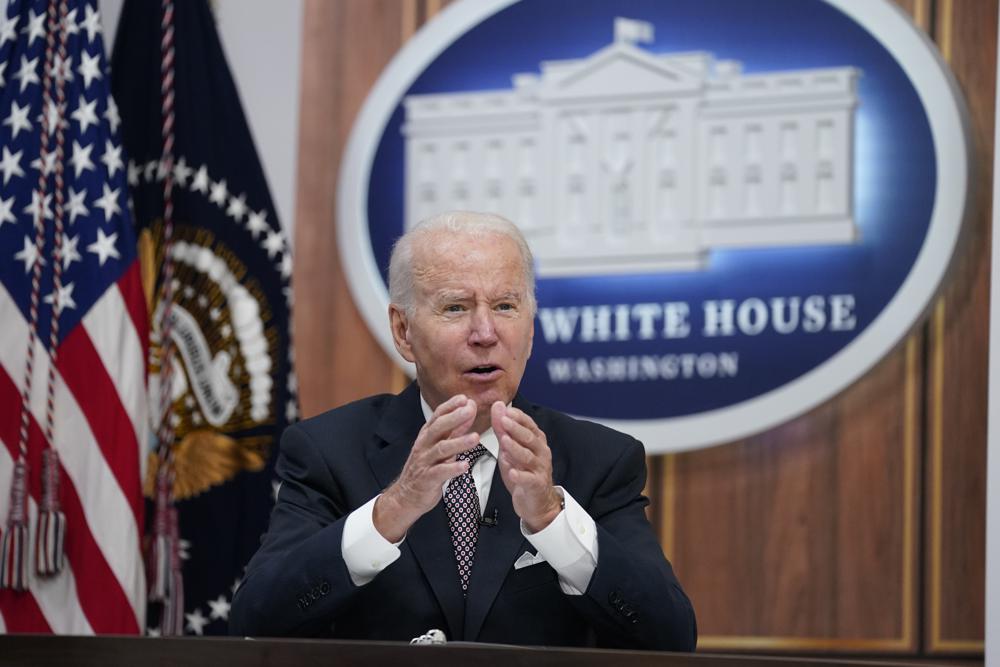
By Josh Boak and Emily Swanson | The Associated Press
June 29, 2022
WASHINGTON (AP) — An overwhelming and growing majority of Americans say the U.S. is heading in the wrong direction, including nearly 8 in 10 Democrats, according to a new poll that finds deep pessimism about the economy plaguing President Joe Biden.
Eighty-five percent of U.S. adults say the country is on the wrong track, and 79% describe the economy as poor, according to a new survey from The Associated Press-NORC Center for Public Affairs Research. The findings suggest Biden faces fundamental challenges as he tries to motivate voters to cast ballots for Democrats in November’s midterm elections.
Inflation has consistently eclipsed the healthy 3.6% unemployment rate as a focal point for Americans, who are dealing with high gasoline and food prices. Even among Democrats, 67% call economic conditions poor.
“He’s doing the best he can — I can’t say he’s doing a good job,” said Chuck McClain, 74. “But his opposition is so bad. I just don’t feel the Democratic Congress is doing enough.”
The Las Vegas resident is a loyal Democrat who said he doesn’t miss an election, but he said the price of gas and groceries, Russia’s war in Ukraine and the country’s deep political divides have led more Americans to feel as though Washington is unresponsive to their needs.
“My wife and I are very frustrated with where the country is headed, and we don’t have a lot of hope for the political end of it to get any better,” he said.
The poll shows only 39% of Americans approve of Biden’s leadership overall, while 60% disapprove. His approval rating fell to its lowest point of his presidency last month and remains at that level. The Democratic president gets hit even harder on the economy, with 69% saying they disapprove of him on the issue. Among Democrats, 43% disapprove of Biden’s handling of the economy.
Just 14% say things are going in the right direction, down slightly from 21% in May and 29% in April. Through the first half of 2021, about half of Americans said the country was headed in the right direction, a number that has steadily eroded in the past year.
Dorothy Vaudo, 66, said she voted for Biden in 2020 but plans to switch allegiance this year.
“I’m a Democrat so I had to vote Democrat, but that’s going to change,” said the Martin County, North Carolina resident.
In recent weeks, Americans have endured even more bad economic news, with inflation continuing to rise, interest rates increasing dramatically and the S&P 500 entering a bear market as many serious economists predict a recession. Yet consumer spending has largely kept pace and hiring remains brisk in a sign that families and businesses have been able to withstand some of the economic pain.
In an interview this month with the AP, Biden traced the decline in his popularity to increases in gas prices that began a year ago. He said that prices shot up further with Russia’s invasion of Ukraine in February. But he rejected claims by Republican lawmakers and some major economists that his $1.9 trillion coronavirus relief package from last year contributed to inflation, noting that price increases were a global phenomenon.
“We’re in a stronger position than any nation in the world to overcome this inflation,” Biden said. “If it’s my fault, why is it the case in every other major industrial country in the world that inflation is higher?”
Douglass Gavilan, a 26-year-old in Miami, is concerned about the “skyrocketing” prices and rent that he sees in his community. Shelter costs are roughly a third of the U.S. consumer price index, so the run-up in rents and home values has started to strain the budgets even of many people living where there are strong job opportunities.
“I don’t even know if I’m going to be able to live here in a few years,” Gavilan said. “I definitely don’t feel confident in the economy.”
Though he doesn’t identify with a political party, Gavilan voted for Biden in 2020. He doesn’t think Biden has proposed anything to make a meaningful difference in his life, but he does think the president’s in a tough spot.
“There’s very little he can do without everyone blaming him for everything,” Gavilan said.
The poll was conducted from Thursday to Monday, with many interviews conducted after the Supreme Court on Friday struck down Roe v. Wade and allowed states to ban abortion — a decision opposed by a majority of the American people in earlier polls, which could also have contributed to the continued slump in the national mood.
The national dissatisfaction is bipartisan, the poll shows. Ninety-two percent of Republicans and 78% of Democrats say the country is headed in the wrong direction. Since last month, the percentage of Democrats saying the country is headed in the wrong direction rose from 66%.
Biden’s handling of the coronavirus pandemic remains a relative bright spot, with 53% of Americans saying they approve of his handling of that issue. On the other hand, only 36% say they approve of Biden’s handling of gun policy; 62% disapprove.
But the economy is what weighs on many Americans as their top priority.
Curtis Musser, 57, a chemistry teacher from Clermont, Florida, said he expects a recession is coming, though he believes it will be mild.
Musser said many Americans simply feel as though they’re at the mercy of events beyond their control, whether that’s the pandemic, rate hikes by the Federal Reserve, war in Europe or political hostilities within the U.S.
“I feel as an individual somewhat helpless,” he said. “I don’t have control of the markets, and you can’t really guess what markets are going do because you don’t know what the Fed is going to do. You don’t know what Congress is going to do. You don’t know what Vladimir Putin is going to do.”
Biden’s approval dips to lowest of presidency: AP-NORC poll
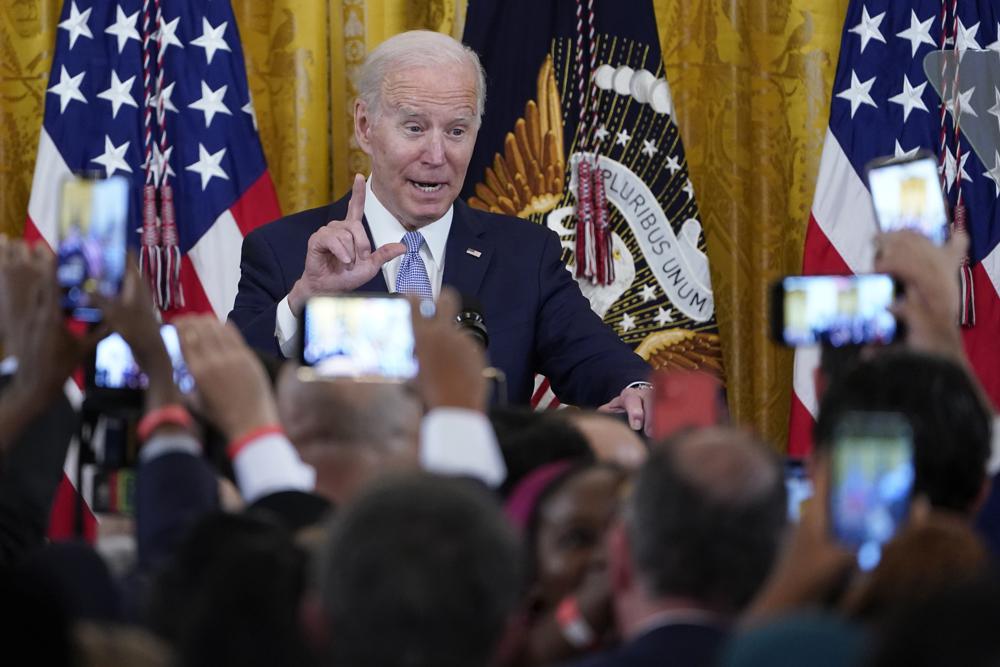
By Nicholas Riccardi | The Associated Press
May 20, 2022
President Joe Biden’s approval rating dipped to the lowest point of his presidency in May, a new poll shows, with deepening pessimism emerging among members of his own Democratic Party.
Only 39% of U.S. adults approve of Biden’s performance as president, according to the poll from The Associated Press-NORC Center for Public Research, dipping from already negative ratings a month earlier.
Overall, only about 2 in 10 adults say the U.S. is heading in the right direction or the economy is good, both down from about 3 in 10 a month earlier. Those drops were concentrated among Democrats, with just 33% within the president’s party saying the country is headed in the right direction, down from 49% in April.
Of particular concern for Biden ahead of the midterm elections, his approval among Democrats stands at 73%, a substantial drop since earlier in his presidency. In AP-NORC polls conducted in 2021, Biden’s approval rating among Democrats never dropped below 82%.
The findings reflect a widespread sense of exasperation in a country facing a cascade of challenges ranging from inflation, gun violence, and a sudden shortage of baby formula to a persistent pandemic.
“I don’t know how much worse it can get,” said Milan Ramsey, a 29-year-old high school counselor and Democrat in Santa Monica, California, who with her husband had to move into her parents’ house to raise their infant son.
Ramsey thinks the economic dysfunction that’s led to her being unable to afford the place where she grew up isn’t Biden’s fault. But she’s alarmed he hasn’t implemented ambitious plans for fighting climate change or fixing health care.
“He hasn’t delivered on any of the promises. I feel like the stimulus checks came out and that was the last win of his administration,” Ramsey said of Biden. “I think he’s tired — and I don’t blame him, I’d be tired too at his age with the career he’s had.”
Republicans have not been warm to Biden for a while. Less than 1 in 10 approve of the president or his handling of the economy, but that’s no different from last month.
Gerry Toranzo, a nurse and a Republican in Chicago, blames Biden for being forced to pinch pennies by taking steps like driving slower to conserve gas after prices have skyrocketed during his administration.
“His policies are destroying the economy,” Toranzo, 46, said of Biden, blaming him for stopping the Keystone XL fuel pipeline to Canada and hamstringing domestic energy production. “It’s a vicious cycle of price increases.”
Overall, two-thirds of Americans disapprove of Biden’s handling of the economy. That rating is largely unchanged over the last few months, though elevated slightly since the first two months of the year.
But there are signs that the dissatisfaction with Biden on the economy has deepened. Just 18% of Americans say Biden’s policies have done more to help than hurt the economy, down slightly from 24% in March. Fifty-one percent say they’ve done more to hurt than help, while 30% say they haven’t made much difference either way.
The percentage of Democrats who say Biden’s policies have done more to help dipped from 45% to 37%, though just 18% say they’ve done more to hurt; 44% say they’ve made no difference.
Some Democrats blame other forces for inflation.
Manuel Morales, an internet service technician in Moline, Illinois, thinks the pandemic and war in Ukraine have had a far bigger impact than Biden’s decisions. But the 58-year-old Democrat is now questioning the benefits of Biden’s biggest legislative achievement, the American Rescue Plan, and its stimulus checks.
“It helped a lot of people, but,” Morales said, “people did not want to go back to work.”
Morales faults Biden on another area of persistent vulnerability to the president — immigration.
Only 38% back Biden on immigration, and Morales is disappointed at the scenes of migrants continuing to cross the southern border. Though he himself is a Mexican immigrant, Morales thinks the U.S. needs to more stringently control its border to have a hope of legalizing deserving migrants who are in the country illegally.
Also, Morales said, there have to be limits. “It’s impossible to bring the whole of Central America and Mexico into this country,” he said.
Another area where Morales faults Biden, albeit mildly, is the war with Ukraine. “We are spending a lot of money going to the Ukraine and all that is going to the deficit,” Morales said.
Overall, 45% of Americans approve of Biden’s handling of the U.S. relationship with Russia, while 54% disapprove. That’s held steady each month since the war in Ukraine began. Seventy-three percent of Democrats and 15% of Republicans approve.
The new poll shows just 21% of Americans say they have “a great deal of confidence” in Biden’s ability to handle the situation in Ukraine; 39% say they have some confidence and 39% say they have hardly any.
Charles Penn, a retired factory worker in Huntington, Indiana, is satisfied with Biden’s performance on Ukraine.
“I think he’s done alright,” Penn, 68, said of the president.
But overall Penn, an independent who leans Republican, is disappointed with Biden, and blames him for rising prices that have squeezed him in his retirement.
“The Democrats in the long run have screwed up things by pushing for higher wages, like going from $7 an hour to $15 an hour,” Penn said, citing the push for a sharp increase in the federal minimum wage that Biden has embraced. “The other side of it is that if you had Republicans, they’d cut my Social Security.”
Still, Penn thinks Biden should pay the political price.
“He’s captain of the ship, so he’s responsible,” Penn said of the president.

